CPU to Core: What Core do I need for my laptop?
Choosing the Best Laptop Processor: A Core Guide
Do more cores make a computer faster?
CPU cores communicate through channels, which uses some speed. However, increasing the number of cores generally boosts system performance.
A multi-core processor has two or more cores, each of which reads and executes program instructions via its communication channels at same time to achieve a higher processing rate.
High core count processors have offer higher computational power but consume more energy, leading to potential overheating and damage to critical components, affecting functionality
Additionally increasing more core isn’t the sole determinant to achieve more computational power, factors like cache size, ,clock speed, Width of the data bus the processor’s underlying architecture also significantly play an important aspect in overall processor performance.
Is it better to have a higher cpu speed or more cores?
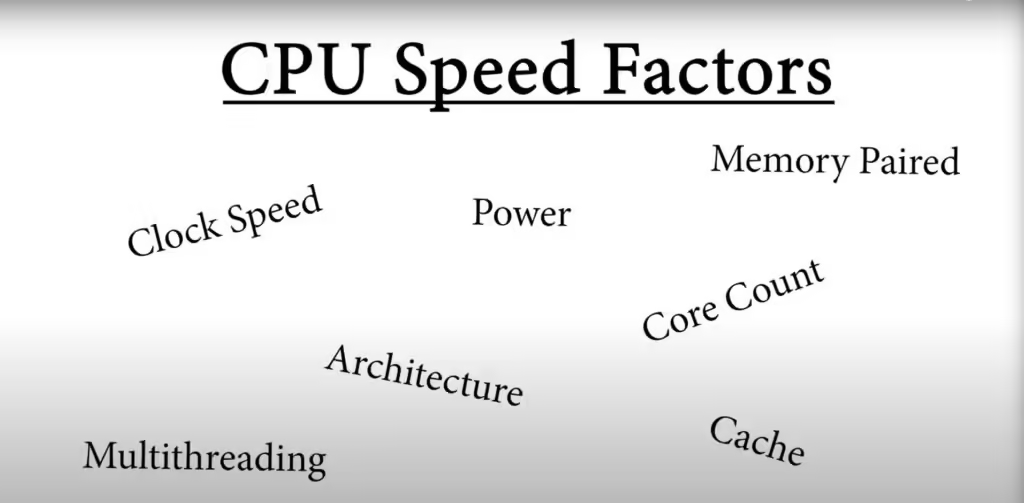
Higher core counts provide you more computational power and significantly improved performance for processor.While core count is crucial, other factors like clock speed, cache size,multithreading and processor architecture influence CPU performance.
Generally, more cores enhance multitasking and application speed, particularly for demanding tasks.
To sum up, a quad-core processor is ideal for most users’ daily laptop tasks. However, if you need extra power for cpu hunger applications, consider a six-core or eight-core CPU.
Which laptop Core is better?
Please refer below table for better laptop core.
Requirements | Suitable processors |
Basic Everyday tasks (Browsing) | AMD A4,AMD A6,Intel Core i3,Intel Celron,Intel Pentium, |
Online vedio streaming,watching movies and more | AMD Ryzen3,,AMD A8, AMD A9,AMD A10, Intel Core i3 |
Regular office work | AMD Ryzen 3, AMD Ryzen 5, Intel Core i3 and Intel Core i5 |
Coding, programming and light gaming | AMD Ryzen 5 and AMD Ryzen 7 ,Intel Core i5, Intel Core i7, |
Designing needs(Heavy gaming/video editing) | AMD Ryzen7,Intel Core i7, Intel Core i9, |
How much Core is best for laptop?
The number of cores required depends on your intended computer use. For web browsing and basic applications, a dual-core or quad-core processor will suffice. However, for more demanding tasks such as video editing or gaming, consider a CPU with six or eight cores.
What is a good processor speed for a laptop?
There is no single “good” processor speed that fits all laptop use cases. The optimal processor speed depends on the user’s specific needs and the type of tasks they will be performing on the laptop.
Here’s a more detailed guideline on recommended processor speeds for different usage scenarios:
1. Basic Everyday Usage:
· For basic tasks like web browsing, document editing, and multimedia playback, a processor speed in the range of 1.6 GHz to 2.4 GHz is generally sufficient. This is the typical speed range for lower-power laptop CPUs, such as Intel Pentium, Celeron, or AMD Athlon processors.
2. Multitasking and Productivity:
· For users who frequently have multiple applications open and engage in more intensive tasks like video conferencing, photo editing, or light content creation, a processor speed between 2.5 GHz and 3.5 GHz is recommended. This is the typical speed range for mid-range laptop CPUs, such as Intel Core i5 or AMD Ryzen 5 processors.
3. Gaming and Content Creation:
· For gaming, video editing, 3D modeling, and other demanding workloads, a processor speed of 3.0 GHz and above is ideal. High-end laptop CPUs, such as Intel Core i7, i9, or AMD Ryzen 7, 9 processors, often have clock speeds in this range, and sometimes even feature boost clock speeds that can reach up to 5 GHz or higher.
It’s important to note that processor speed is not the only factor that determines a CPU’s performance. Other factors, such as the number of cores, cache size, and the underlying architecture, also play a significant role. Some newer, more efficient processor architectures can deliver better performance at lower clock speeds compared to older designs.
Additionally, modern processors often utilize dynamic clock speed scaling, where the CPU can adjust its frequency based on the workload and thermal conditions, providing a balance between performance and power efficiency.
In summary, for most general-purpose laptop users, a processor speed in the range of 2.5 GHz to 3.5 GHz is a good sweet spot, offering a good balance of performance and efficiency. However, users with more demanding needs, such as gaming or content creation, may benefit from a processor with a higher clock speed, typically 3.0 GHz and above.
is it better to have a higher cpu speed or more cores?
Again it depends on your uses , whether are you use fast data rendering programs lover or simultaneously running multiple programs2.
· If you often run multiple programs simultaneously, opt for more cores and a lower CPU speed.
· For processor-intensive games or fast data rendering programs, choose a high CPU speed with fewer cores.
What specifications to look for when buying a laptop?
When buying a laptop, Below are some key specifications to consider:
| 1. Processor (CPU): | · Processor type (e.g., Intel Core i5, i7, i9 or AMD Ryzen 5, 7, 9) |
| · Processor generation (e.g., 12th, 13th, or 14th Gen Intel) | |
| · Processor core and thread count (quad-core, hexa-core, octa-core) | |
| · Processor clock speed (measured in GHz) | |
| 2. Memory (RAM): | · RAM capacity (e.g., 8GB, 16GB, 32GB) |
| · RAM type and speed (e.g., DDR4, DDR5) | |
| 3. Storage: | · Solid-state drive (SSD) capacity and type (SATA, NVMe) |
| · Hard disk drive (HDD) capacity and speed (RPM) | |
| 4. Display: | · Display size (13-inch, 15-inch, 17-inch) |
| · Display resolution (Full HD, Quad HD, 4K) | |
| · Display type (IPS, OLED, LCD) | |
| · Display refresh rate (60Hz, 120Hz, 144Hz) | |
| 5. Graphics: | · Integrated graphics (e.g., Intel UHD, Iris Xe) |
| · Dedicated graphics card (e.g., NVIDIA GeForce, AMD Radeon) | |
| · Graphics memory (e.g., 4GB, 6GB, 8GB) | |
| 6. Connectivity: | · Wi-Fi and Bluetooth versions |
| · Ports (USB, HDMI, Thunderbolt, etc.) | |
| 7. Battery life: | · Battery capacity (measured in Watt-hours) |
| · Estimated battery life | |
| 8. Other features: | · Operating system (Windows, macOS, Chrome OS) |
| · Webcam resolution | |
| · Fingerprint reader or other biometric security | |
| · Weight and dimensions |
What is more important in laptop core or generation?
When selecting a laptop, both processor (core), generation and model are crucial factors. Newer processor(core), generations often deliver improved power efficiency and performance compared to older ones, even within the same processor series. However, a high-performance processor from an older generation can still outperform a lower-tier processor from a newer generation.
The optimal processor ultimately depends on your specific needs and budget (core and generation). For high demanding tasks like gaming or video editing, a high-performance, recent-generation processor is often essential. However, if budget is a constraint and your usage is primarily focused on basic computing, a slightly older generation processor might still be sufficient.
How do I know how many cores my laptop has before I buy it?
To check how many core in laptop ,please follow steps below:
Press Ctrl+Alt+Delete, and select Task Manager==>Click More details.==>Click Performance.==>Check Cores number.==>Check logical processors number (threads).
a) Task Manager==>Click More details.

b) Click Performance
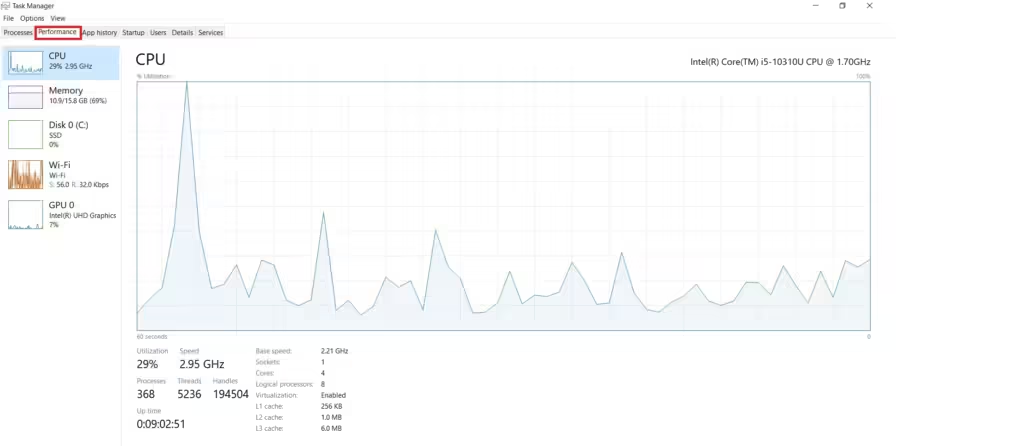
c) Check Cores number
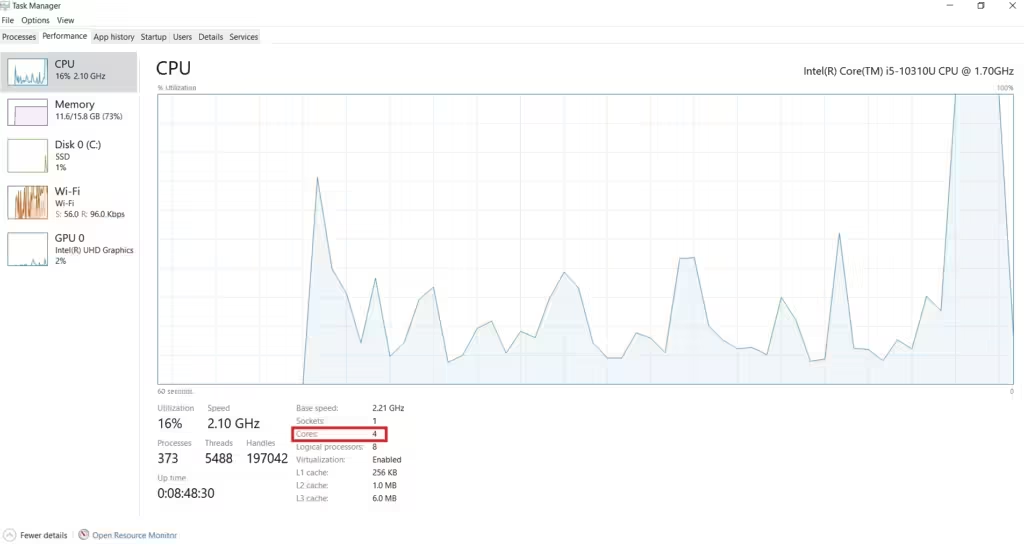
d) Check logical processors number (threads).
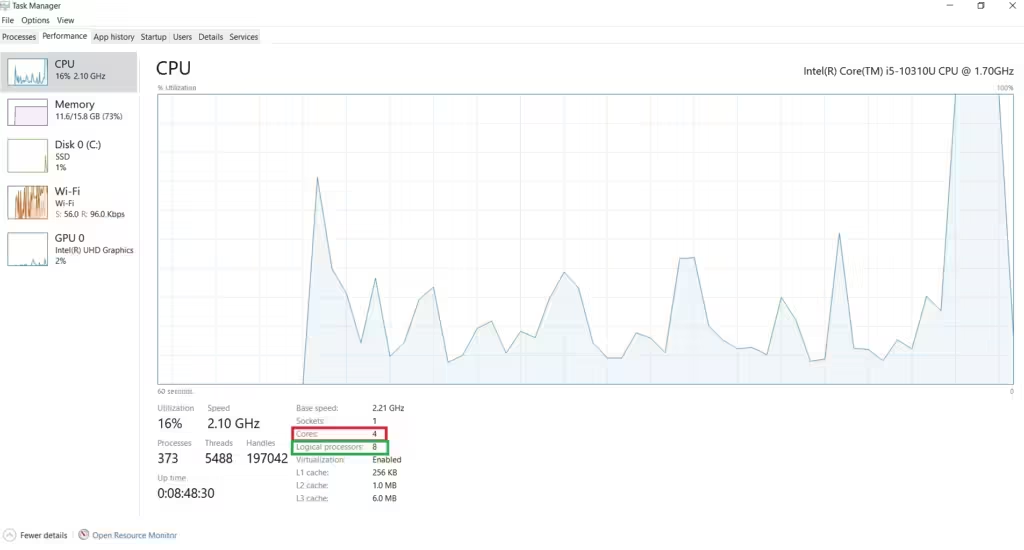
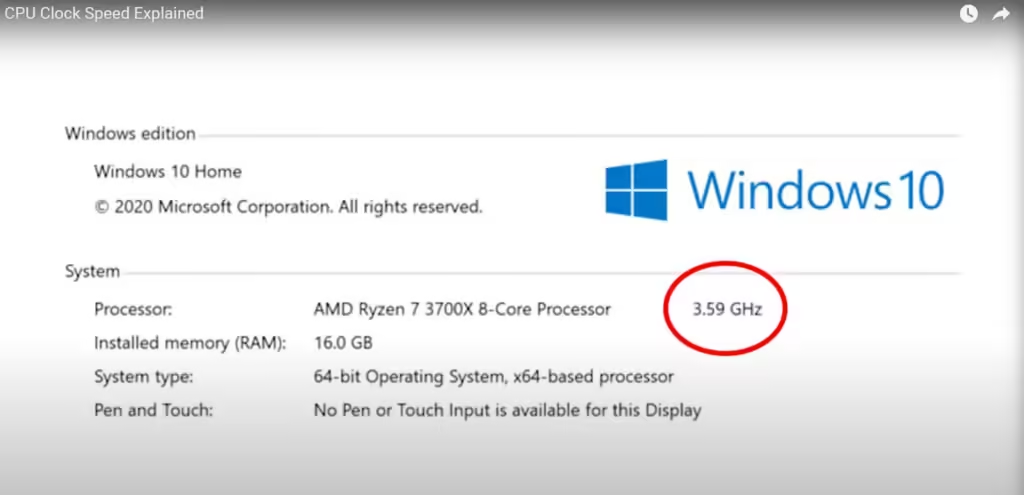
Core and CPU FAQs?
Does more cores mean better CPU?
Please refer this section .
Does my CPU have cores?
Please refer section How do I know how many cores my laptop has before I buy it?
What is processor or core ?
Core is the series of processors written in your laptop sticker. Core is popular series of processors between intel (Pentium and Celeron) and AMD (Ryzen,Athlon etc).
Processor is depends upon its clock speed , better bandwidth, multithreading, higher smarter cache, core channels and faster supported RAM to provide its computational power.
What is generation ?
Generation is typically refer to model year of laptop’ s components including graphics card, memory ,processors and other hardware components.
Newer generation often offers improvement in power efficiently , performance and new featured compare to previous older Generation.